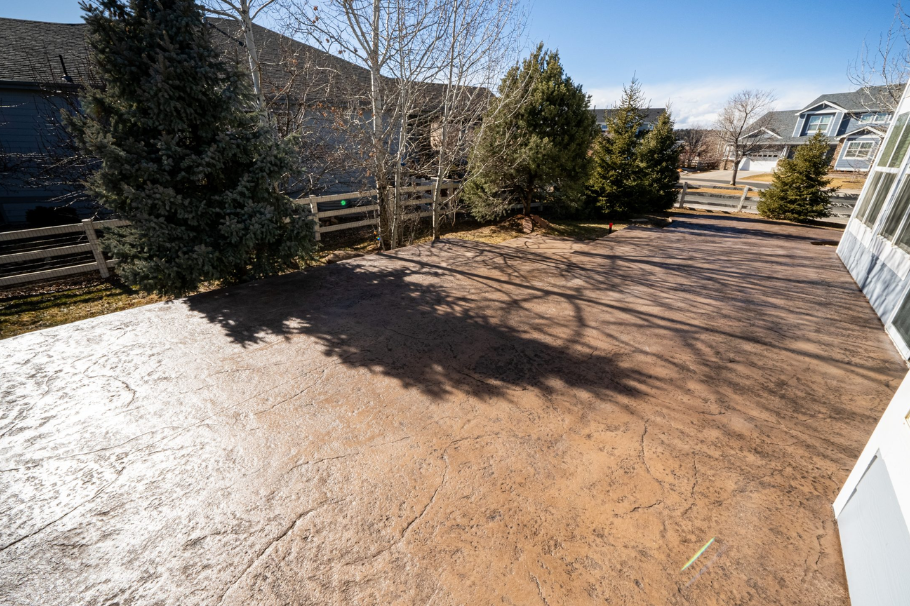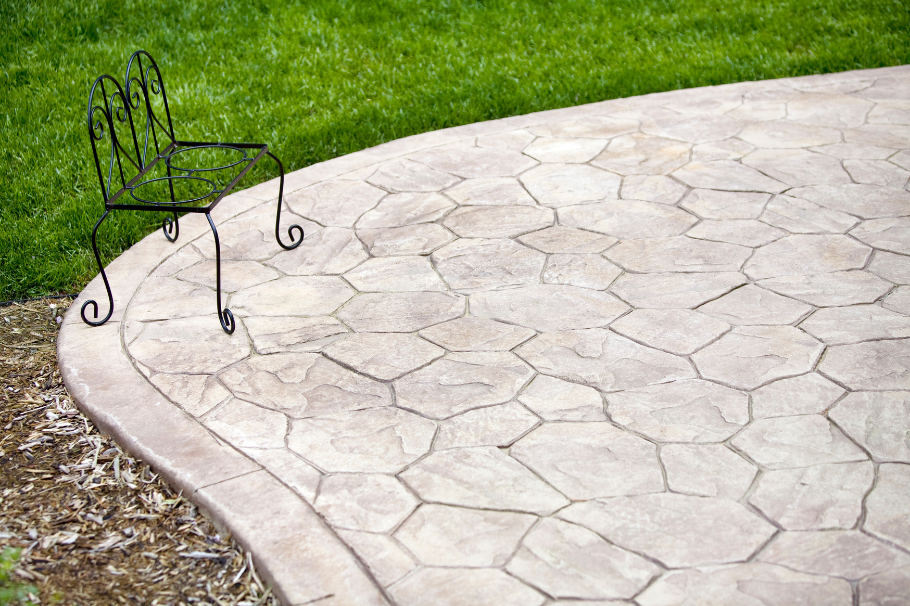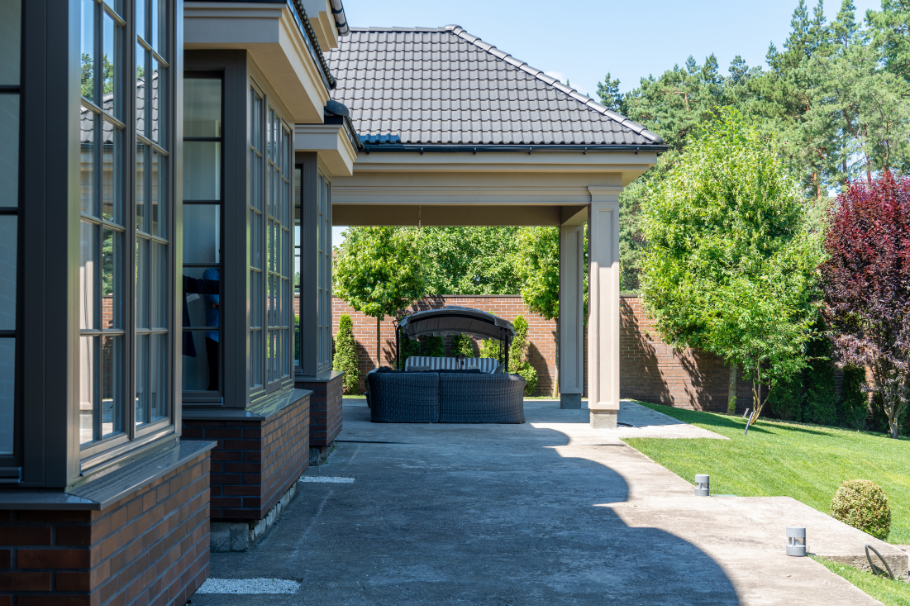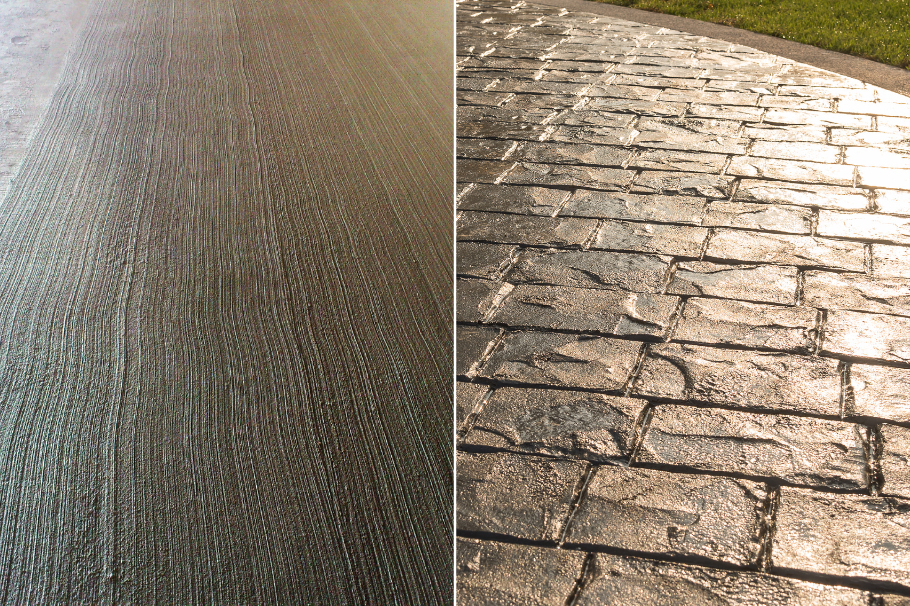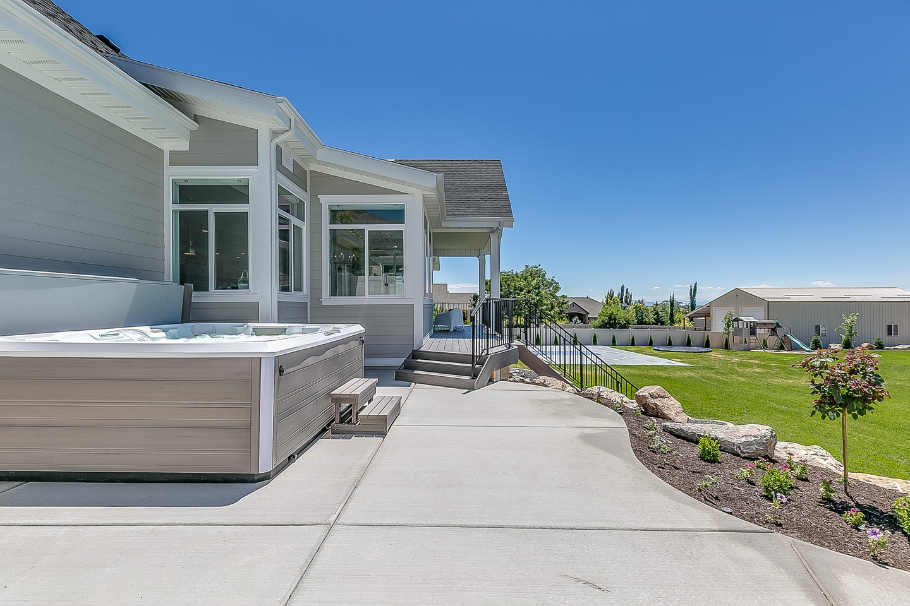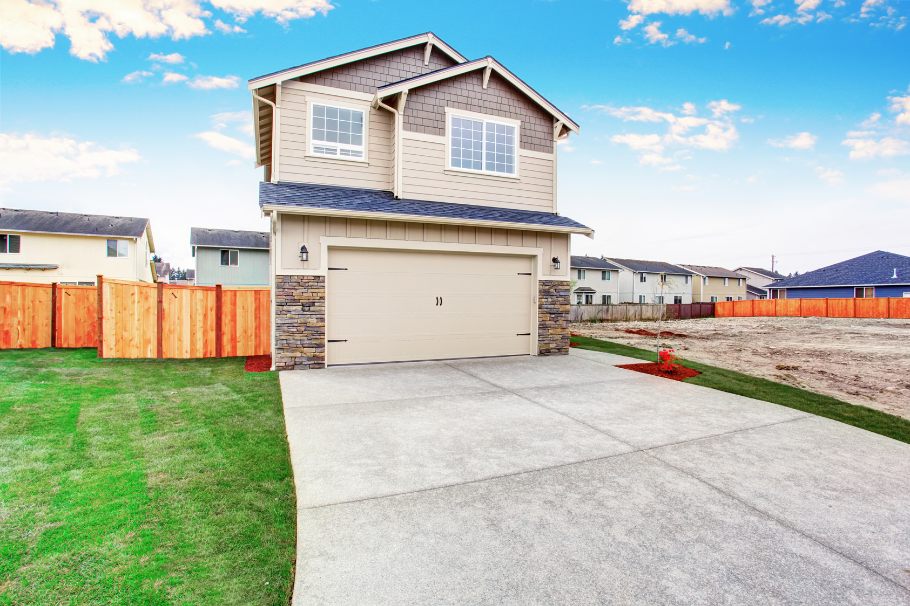Can You Stamp Concrete on Existing Concrete?
Stamped concrete is a popular choice for homeowners and businesses looking to enhance outdoor spaces. According to Concrete Network, stamped concrete offers both durability and beauty, making it a versatile option. Many wonder if it’s possible to apply stamped concrete over existing concrete. The answer? Yes, it’s achievable! However, it requires careful planning, proper preparation, and expert execution to ensure durability and an aesthetically pleasing result. This blog will explore how stamped concrete can transform old surfaces, the steps involved in the process, and essential considerations for success.
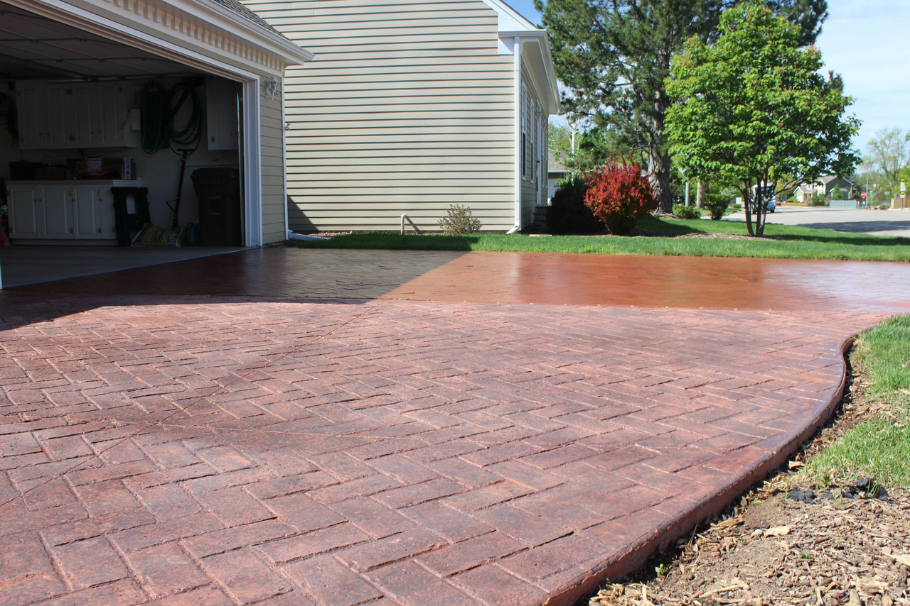
What Is Stamped Concrete?
Stamped concrete is a decorative technique that mimics the appearance of natural materials like stone, brick, or wood. Moreover, it’s achieved by pressing molds into freshly poured concrete, leaving behind intricate patterns and textures. Furthermore, it offers a cost-effective alternative to using actual stone or tile, providing similar beauty without the hefty price tag. HomeAdvisor highlights that stamped concrete costs significantly less than stone or brick while offering comparable visual appeal.
Is Stamped Concrete Suitable for Existing Concrete?
Stamped concrete can be applied over existing concrete as long as the base is structurally sound. Additionally, the process involves applying a thin overlay or resurfacing layer to the old surface before imprinting the desired pattern. What's more, this approach eliminates the need for expensive demolition, saving time and money. Take note, though, that proper evaluation of the existing concrete is crucial to ensure long-lasting results. Concrete Construction Magazine provides detailed guidelines for assessing and resurfacing old concrete.
Steps to Apply Stamped Concrete Over Existing Concrete
Assessment of Existing Surface
First, inspect the current concrete for cracks, unevenness, or structural issues. Moreover, repairing any damages ensures a strong foundation for the overlay.
Cleaning and Preparation
Additionally, thoroughly clean the surface to remove dirt, grease, and debris. A pressure washer works best for this step. The Spruce offers step-by-step advice on cleaning concrete effectively.
Applying a Bonding Agent
Furthermore, a bonding agent helps the overlay adhere securely to the old surface. This step is critical for preventing delamination.
Overlay Application
What’s more, a thin layer of concrete overlay is spread across the existing surface to create a fresh canvas for stamping.
Stamping the Overlay
Take note, stamping must be done while the overlay is still wet. Experts use molds to imprint the desired pattern. Quikrete provides materials and tips for this step.
Curing and Sealing
Finally, allow the surface to cure for several days before applying a sealant. Moreover, sealing protects the design from wear and tear, ensuring its beauty lasts. Learn more about sealants from Angi.
Benefits of Stamped Concrete on Existing Surfaces
Stamped concrete offers numerous benefits, especially when applied over existing concrete. Furthermore, these advantages make it an appealing choice for homeowners and business owners alike.
1. Cost-Effective Solution
Applying it over existing concrete eliminates the need for removal and replacement. This reduces labor and material costs significantly.
2. Environmentally Friendly
What’s more, reusing the existing surface minimizes waste and promotes sustainable construction practices.
3. Aesthetic Appeal
Moreover, the technique adds visual interest with customizable patterns and colors. It can replicate expensive materials at a fraction of the cost.
4. Enhanced Durability
Furthermore, when properly sealed, it resists wear, moisture, and UV rays, ensuring long-term performance.
5. Increased Property Value
Take note, a beautifully stamped surface can boost curb appeal and increase your property’s overall value. Zillow notes that curb appeal plays a significant role in property valuation.
Important Considerations Before Stamping Existing Concrete
Structural Integrity
Ensure the existing concrete is free from major cracks or severe damage. Structural weaknesses can compromise the overlay’s performance.
Thickness of the Overlay
The overlay must be thick enough to withstand foot and vehicle traffic. Typically, a minimum of 1/4 inch is recommended.
Professional Expertise
Hiring experienced contractors is essential for a flawless finish. Experts understand the nuances of overlay application and stamping techniques.
Surface Drainage
Take note, proper drainage prevents water pooling, which can damage the surface over time.
Popular Stamped Concrete Patterns
Herringbone
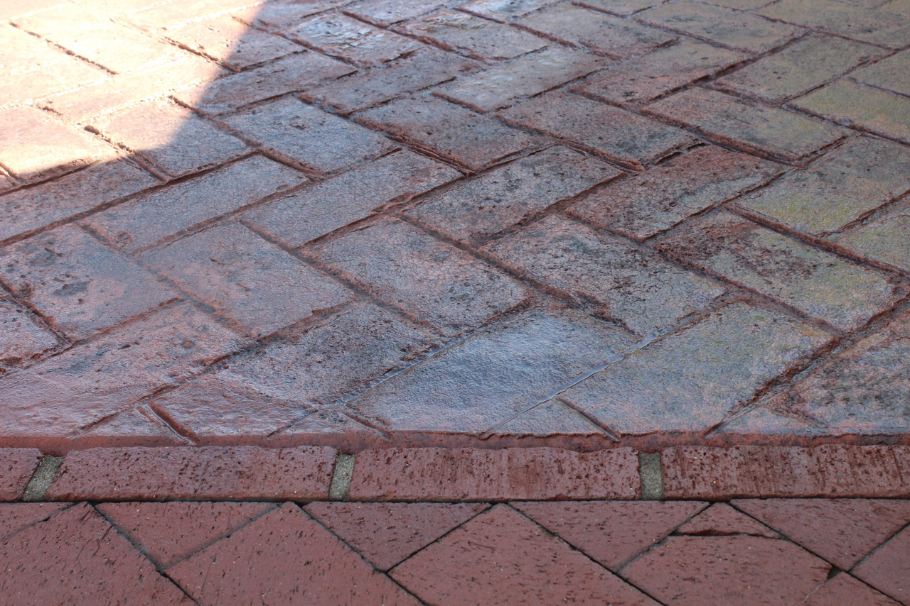
Herringbone is a classic pattern that brings a refined, geometric touch to patios, walkways, and driveways. Moreover, it creates an eye-catching design with its zigzag arrangement.
Ashlar Slate
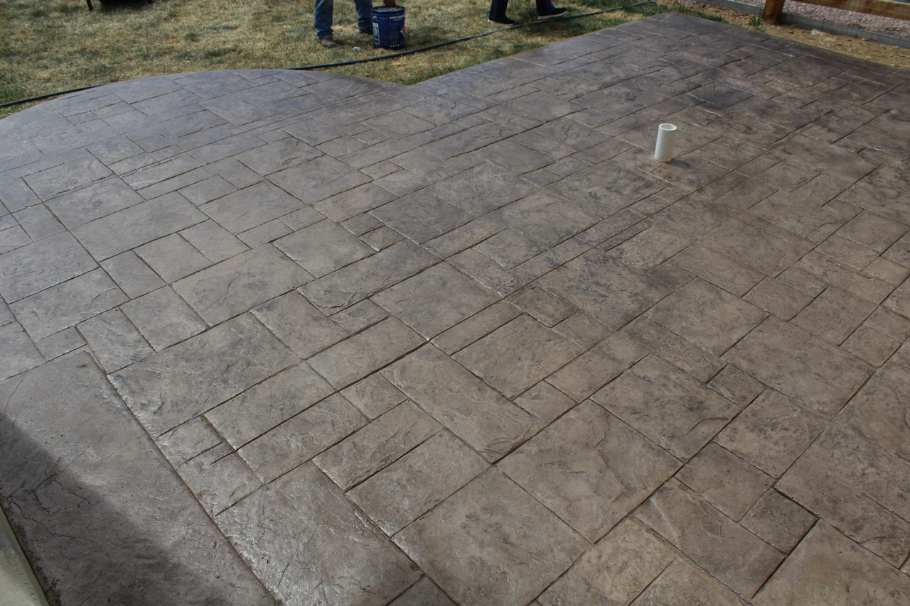
Ashlar Slate offers a versatile look with irregular stone patterns. Furthermore, it’s a popular choice for creating elegant outdoor spaces.
Brick
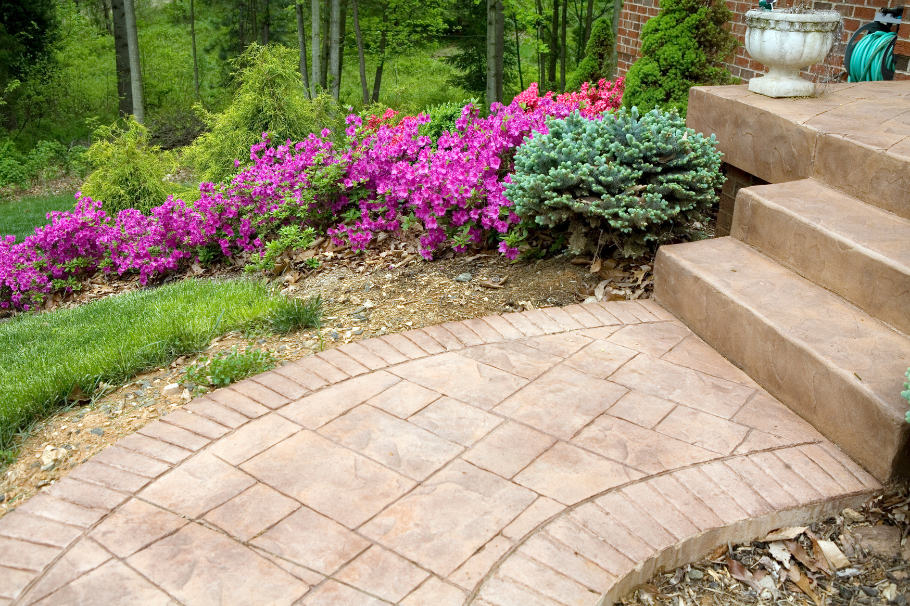
Brick patterns mimic the classic look of traditional brickwork. What’s more, they’re perfect for walkways and decorative borders.
Cobblestone
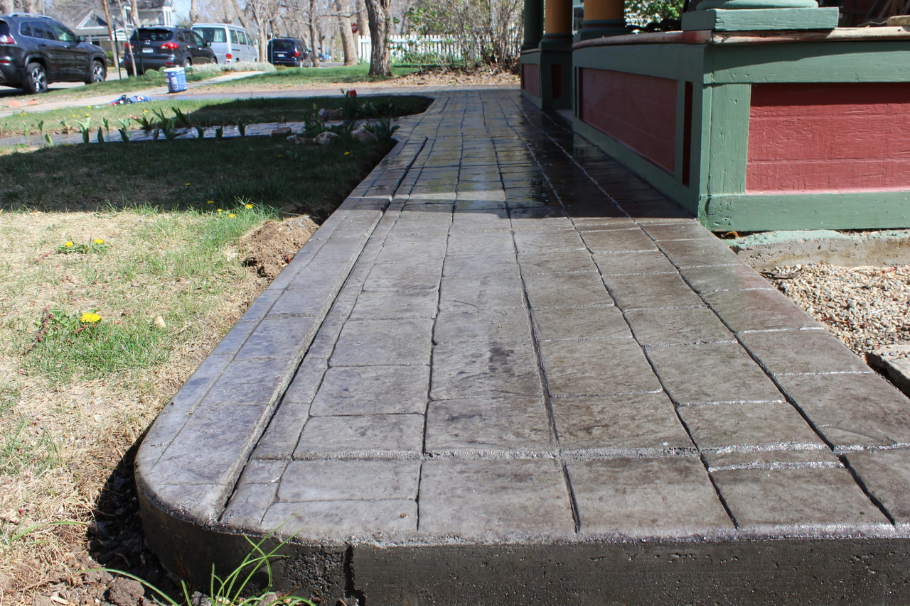
Cobblestone provides a timeless, old-world charm that works well for driveways, patios, and walkways. Additionally, its interlocking stone pattern adds elegance to any outdoor space.
Cost of Stamped Concrete on Existing Concrete
The cost of applying stamped concrete over an existing surface varies depending on factors such as the area size, pattern complexity, and location. On average, prices range from $16 to $40 per square foot. Furthermore, this cost includes surface preparation, overlay application, stamping, and sealing.
Cost Comparison of Stamped Concrete vs. Natural Materials
| Material | Average Cost per Sq. Ft. | Lifespan (Years) |
|---|---|---|
| Stamped Concrete | $16 - $40 | 20+ |
| Natural Stone | $40 - $60 | 30+ |
| Brick Pavers | $20 - $50 | 25+ |
Maintenance Tips for Stamped Concrete
Clean Regularly
Sweep and wash the surface to prevent dirt buildup.
Reseal Periodically
Reseal every 2–3 years to maintain the surface’s shine and durability.
Avoid Harsh Chemicals
Use mild cleaning agents to prevent damage to the sealant.
Repair Cracks Promptly
Take note, addressing small cracks early prevents them from spreading.
FAQs About Stamped Concrete on Existing Concrete
Can I DIY Stamped Concrete Overlays?
- While it’s possible, the process requires specialized tools and expertise. Hiring professionals ensures better results.
How Long Does the Process Take?
- The timeline depends on the project size but typically ranges from 3–7 days.
Is Stamped Concrete Slippery When Wet?
- Spplying a non-slip additive during sealing enhances traction, reducing slipperiness.
Can I Change the Color of Existing Stamped Concrete?
- Recoloring is possible using concrete stains or dyes. A new sealant is applied after coloring.
How Long Does Stamped Concrete Last?
- With proper care, stamped concrete can last over 20 years.
Why Choose Rapid Valley Concrete for Stamped Concrete Projects?
At Rapid Valley Concrete, we take pride in transforming ordinary spaces into stunning outdoor areas. Moreover, our team specializes in stamped concrete projects, delivering exceptional results every time. We ensure every project is completed with attention to detail and top-quality materials. Our experienced professionals guide you through every step of the process, from planning to sealing. When you work with us, you can expect superior craftsmanship and outstanding customer service. Let’s bring your vision to life with beautiful stamped concrete.
